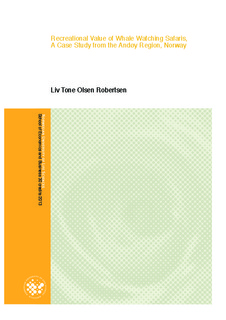| dc.contributor.author | Robertsen, Liv Tone Olsen | |
| dc.date.accessioned | 2014-02-11T11:29:50Z | |
| dc.date.available | 2014-02-11T11:29:50Z | |
| dc.date.copyright | 2013 | |
| dc.date.issued | 2014-02-11 | |
| dc.identifier.uri | http://hdl.handle.net/11250/187594 | |
| dc.description.abstract | Due to increased activity level along the Norwegian coast and ocean, there is an increasing need of estimating the non-market values from potentially affected marine ecosystem services. One activity that might be impacted from marine activities and regulations is whale watching. The demand of whale watching has increased rapidly the past decades, and generates remarkable economic and recreational benefits to the society. The recreational benefits are not directly obtained through the market prices, and have to be estimated using non-market valuation methods. Using the contingent valuation (CV) method to value recreational value of commercial whale watching in the Andøy region and the factors influencing it, this thesis is the first study of its kind in Norway (to my knowledge). Furthermore, the study contributes to the literature by being the first recreational valuation study of whale watching examining how varying tour specific factors and expectations of whale watchers affect recreational value.
Data was collected at the whale watch site during five weeks from mid-July to mid-August 2013, resulting in 285 responses. The results indicate that whale watching in the Andøy region generates significant recreational benefits (i.e. non-market values). Similar to other studies, this thesis finds a larger share of the whale watchers to have a positive recreational value (i.e. consumer surplus). However, there are also a relatively large number of those responding “zero” consumer surplus (CS), indicating that the potential of converting more of consumer surplus (CS) to producer surplus (PS) is limited. The results of this thesis argue that more studies should be conducted on non-market values of whales in order to estimate the total economic value (TEV) of these marine resources. Concerning influential factors, a number of factors were found to have a significant impact on recreational value of whale watching. The statistical relationships derived between recreational value and certain tour specific attributes are especially interesting, as codes of conducts are increasingly applied around the world. | no_NO |
| dc.language.iso | eng | no_NO |
| dc.publisher | Norwegian University of Life Sciences, Ås | |
| dc.subject | Marine ecosystem services | no_NO |
| dc.subject | recreational value | no_NO |
| dc.subject | consumer surplus | no_NO |
| dc.subject | non-market valuation | no_NO |
| dc.subject | Codes of Conducts | no_NO |
| dc.subject | Andøy | no_NO |
| dc.subject | Whales | no_NO |
| dc.subject | contingent valuation | no_NO |
| dc.subject | Tourism | no_NO |
| dc.title | Recreational valuation of whale watching safaris, a case study from the Andøy region | no_NO |
| dc.type | Master thesis | no_NO |
| dc.subject.nsi | VDP::Agriculture and fishery disciplines: 900::Agriculture disciplines: 910::Management of natural resources: 914 | no_NO |
| dc.subject.nsi | VDP::Medical disciplines: 700::Health sciences: 800::Other health science disciplines: 829 | no_NO |
| dc.subject.nsi | VDP::Social science: 200::Psychology: 260::Other psychology disciplines: 279 | no_NO |
| dc.source.pagenumber | 117 + 17 | no_NO |
